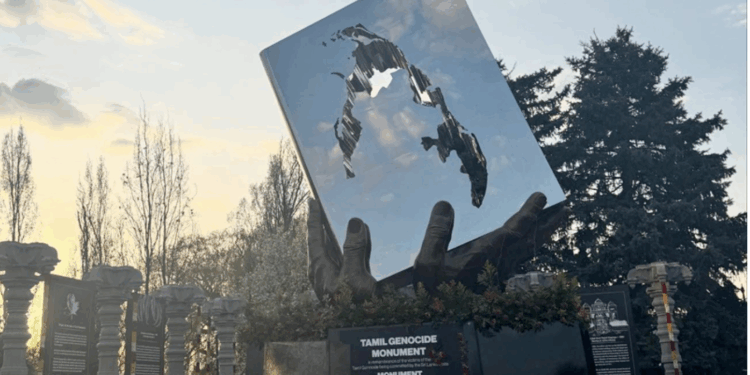Title: Tamil Genocide Education Week Bill Sparks Controversy in Ontario, Reflecting Deep Divisions Over Sri Lanka’s Wartime Legacy

Toronto, ON – Standing outside Queen’s Park decades ago, Vijay Thanigasalam was just another face in a protest, a young Tamil refugee pleading with Canada to stop the bloodshed in his homeland of Sri Lanka. Today, he stands inside Ontario’s Legislative Assembly not as a protester, but as a lawmaker.
Thanigasalam, now the Progressive Conservative MPP for Scarborough–Rouge Park, recently saw his private member’s bill, An Act to Proclaim Tamil Genocide Education Week, pass second reading on May 16. The bill seeks to formally recognize the mass atrocities committed against Tamils during Sri Lanka’s decades-long civil war as genocide and proposes an annual educational week leading up to May 18 the date the war ended in 2009.
“For so long, the Tamil community was voiceless,” Thanigasalam said in an interview. “Now, we are using our voices not just to remember but to heal.”
The bill has ignited fierce debate, reigniting tensions from a war that ended 15 years ago but remains raw for Tamil-Canadians and others in Canada’s Sri Lankan diaspora. While many Tamil organizations and community leaders support the initiative as a long-overdue acknowledgment of historical trauma, other Sri Lankan-Canadian groups particularly those of Sinhalese heritage strongly oppose the bill’s use of the term “genocide.”
They argue that the label is inaccurate and dangerously divisive. Critics like Dr. Neville Hewage, a Sri Lankan-born legal academic and Adjunct Professor at Laurentian University, point to multiple rulings from Canadian courts, including the Ontario Court of Appeal and the Supreme Court of Canada, which have determined that a Tamil genocide did not take place in Sri Lanka.
“The courts have been clear,” Dr. Hewage said in a recent statement. “The claim of genocide has not been legally substantiated. What’s more, the courts ruled that the bill overreaches provincial jurisdiction under the Constitution Act of 1867. It cannot be used to mandate curriculum content in schools.”
Dr. Hewage, who led a costly legal challenge against the bill estimated at $350,000 says the outcome was a legal victory for truth and constitutional clarity. While the courts ultimately upheld the bill’s symbolic nature, they ruled it cannot impose educational mandates.
Despite that, Thanigasalam remains firm. “This is about memory, about refusing to let the truth be buried. In May 2009, there was not just a destruction of people, but of evidence, of history,” he said.
During the final stages of the war, the Sri Lankan military’s offensive against the separatist Liberation Tigers of Tamil Eelam (LTTE) led to tens of thousands of civilian deaths, according to United Nations estimates. The Tamil community, both in Sri Lanka and in the diaspora, marks May 18 Mullivaikkal Remembrance Day as a day of mourning and protest.
Thanigasalam’s bill seeks to enshrine that remembrance in Ontario’s official calendar. Supporters like Gary Anandasangaree, federal MP and Canada’s current Justice Minister and Attorney General, say the initiative is a “step forward in our collective struggle to seek recognition for victims of the #Mullivaikal Genocide.”
Neethan Shan, former president of the Ontario NDP and director of the Tamil Canadian Centre for Civic Action, has called for cross-party support, emphasizing the nonpartisan nature of the community’s pursuit of justice.
But even among supporters, there is acknowledgment that no international tribunal or national government including Canada has yet formally recognized the events as genocide. Prime Minister Justin Trudeau, in his May 18 statement, offered condolences and called for “meaningful accountability” but stopped short of using the term.
The international legal consensus remains complex. While groups like Human Rights Watch and Amnesty International have documented extensive war crimes and human rights violations by both sides, including the LTTE’s use of child soldiers and suicide bombings, formal genocide determinations are rare and legally specific.
The controversy has also become legally tangled. While the Canadian Parliament declared May 18 as Tamil Genocide Remembrance Day in 2022, legal decisions such as those cited by Dr. Hewage, have ruled that the education component of Ontario’s proposed law falls outside provincial jurisdiction.
Still, for Thanigasalam and many in his community, the legal semantics matter less than the need for recognition and healing.
“I remember a girl we called akka elder sister who picked jasmine near our home,” Thanigasalam recalled. “She was killed in a bombing. My mother tried to shield me, but I saw a truck with pieces of human flesh. That memory never leaves.”
His voice joins thousands who carry similar trauma. They see the bill not as an attack, but as a reckoning. Yet opponents warn it risks rewriting history with a single, politically charged narrative.
As the bill moves toward potential standing committee hearings and a third reading, the debate will likely intensify. For now, Tamil Genocide Education Week remains both a rallying cry and a legal battleground, one that continues to reflect the unresolved wounds of a distant war playing out in the heart of Canadian democracy.







